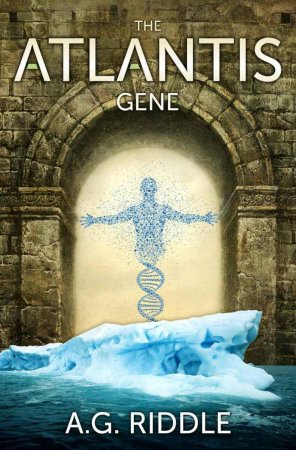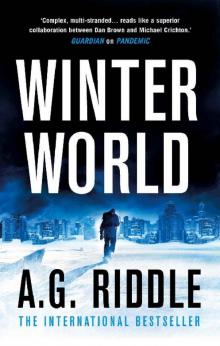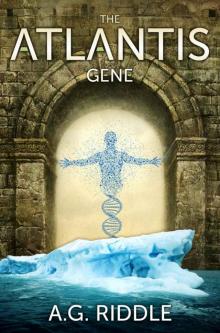- Home
- A. G. Riddle
The Atlantis Gene: A Thriller (The Origin Mystery, Book 1) Page 2
The Atlantis Gene: A Thriller (The Origin Mystery, Book 1) Read online
Page 2
She couldn’t tell Ben what she was doing in the lab, at least not yet. It might amount to nothing, and more than likely, they were all out of a job anyway. Involving him would only make him an accomplice to a possible crime.
Kate nodded to the flashing fixture in the corner of the room. “What’s that strobe light?”
Ben glanced over his shoulder at it. “Not sure. An alarm, I think—”
“Fire?”
“No. I made rounds when I got here, it’s not a fire. I was about to do a thorough inspection when I noticed your door cracked.” Ben reached into one of the dozen cardboard boxes that crowded Kate’s office. He flipped through a few framed diplomas. “Why don’t you put these up?”
“I don’t see the point.” Hanging the diplomas wasn’t Kate’s style and even if it were, who would she impress with them? Kate was the only investigator and physician on the study, and all seven of the staff knew her CV. They received no visitors, and the only other people who saw her office were the two dozen staff who cared for the autistic children in the study. The staff would think Stanford and Johns Hopkins were people, long deceased relatives maybe, the diplomas perhaps their birth certificates.
“I’d put it up, if I had an MD from Johns Hopkins.” Ben carefully placed the diploma back in the box and rummaged around in it some more.
Kate drained the last of the coffee and set the cup down. “I’ll trade you for another cup of coffee.” Ben’s coffee made Starbucks taste like motor oil.
“So I can give you orders now?”
“Don’t get carried away,” Kate said as Ben left the room. She stood and twisted the hard plastic cylinder that controlled the blinds, revealing a view of the chain-link fence that circled their building and beyond it, the crowded streets of Jakarta. The morning commute was in full swing. Buses and cars crept along as motorcycles darted in and out of the tight spaces between them. Bicycles and pedestrians filled every square inch of the sidewalks. And she had thought the traffic in San Francisco was bad.
It wasn’t just the traffic. Jakarta still felt so foreign to her. It still wasn’t home. Maybe it never would be. Four years ago, Kate would have moved anywhere in the world, any place that wasn’t San Francisco. Martin Grey, her adoptive father, had said, “Jakarta would be a great place to continue your research… and… to start over.” He had also said something about time healing all wounds. But now she was running out of time.
She turned back to the desk and began clearing away the photos Ben had taken out. She stopped at a faded picture of a large dancing room with a parquet floor. How had it gotten in with her work things? It was the only photo she had of her childhood home in West Berlin, just off Tiergartenstraße. Kate could barely picture the massive three-story home. In her memory, the home felt more like a foreign embassy or a grand residence from another time. A castle. An empty castle. Kate’s mother had died during childbirth, and while her father was loving, he was mostly absent. Kate tried to picture him in her mind’s eye, but she couldn’t. There was only a vague recollection of a cold day in December when he had taken her for a walk. She remembered how tiny her hand felt inside of his, how safe she felt then. They had walked all the way down Tiergartenstraße, to the Berlin Wall. It was a somber scene: families placing wreaths and pictures, hoping and praying for the Wall to fall and their loved ones to return. The other memories were flashes of him leaving and returning, always with some trinket from a far-away place. The house staff had taken up the slack as best they could. They were attentive, maybe a little cold. What was the housekeeper’s name? Or the tutor who lived with her and the other staff on the top floor? She had taught Kate German. She could still speak German, but she couldn’t remember the woman’s name.
About the only clear memory of the first six years of her life, in West Berlin, was the night Martin came into her dance room, turned the music off, and told her that her father wasn’t coming home — ever again — and that she would be coming to live with him.
She wished she could erase that memory, and she’d just as soon forget the thirteen years that followed. She had moved to America with Martin, but the cities ran together as he rushed off to one expedition after another and she was shipped off to one boarding school after another. None of them ever felt like home either.
Her research lab. It was the closest thing she had ever had to a real home. She spent every waking moment there. She had thrown herself into her work after San Francisco, and what had started as a defense mechanism, a survival mechanism, had become her routine, her lifestyle. The research team had become her family and the research participants her children.
And it was all about to go away.
She needed to focus. And she needed more coffee. She pushed the pile of photos off the desk and into the box below. Where was Ben?
Kate walked out into the hall and made her way to the staff kitchen. Empty. She checked the coffee pot. Empty. The strobe lights were going off here too.
Something was wrong. “Ben,” Kate called out.
The other research staff wouldn’t be here for hours. They kept strange hours, but they did good work. Kate cared more about the work.
She ventured out into the research wing, which consisted of a series of storage rooms and offices surrounding a large cleanroom lab, where Kate and her team engineered gene therapy retroviruses they hoped would cure autism. She peered through the glass. Ben wasn’t in the lab.
The lab was eerie at this time of morning. So quiet and empty. Not quite dark, but not light either, as shafts of focused sunlight poured into the hallways from the windows in the rooms on each side.
Kate’s footfalls echoed loudly as she prowled the cavernous lab, peeking into each room, squinting to see through the bright Jakartan sun. All empty. That left the residential section — the housing units, kitchens, and supporting facilities for the study’s roughly 100 autistic children.
In the distance, Kate could hear other footsteps, faster than hers — running. She began walking more quickly, in their direction, and just as she turned the corner, Ben reached out and grabbed her arm. “Kate! Follow me, hurry.”
CHAPTER 2
Manggarai Train Station
Jakarta, Indonesia
David Vale stepped back into the shadow of the train station’s ticket counter. He studied the man buying a New York Times from the newsstand. The man paid the vendor, then walked past the trash can without throwing the paper away. Not the contact.
Behind the newsstand, a commuter train crept into the station. It was packed to the walls with Indonesian workers coming into the Capital from the outlying cities for the day’s work. Passengers hung out of every set of sliding double doors, middle-aged men mostly. On the roof of the train, teenagers and young adults sat, squatted, and stretched out, reading newspapers, fiddling with smart phones, and talking. The bursting commuter train was a symbol of Jakarta itself, a city bursting at the seams with a growing population struggling to modernize. Mass transit was only the most visible sign of the city’s struggle to accommodate the 28 million people in its metro area.
The commuters were fleeing the train now, swarming the station like shoppers on Black Friday in America. It was non-controlled chaos. Workers pushed, shoved, and shouted as they ran out the station’s doors, while others fought to get into the station. This happened here and in other commuter train stations throughout the city every day. It was the perfect place for a meet.
David kept his eyes focused on the newsstand. His ear piece crackled to life. “Collector, Watch Shop. Be advised, we’re zero-hour plus twenty.”
The contact was late. The team was growing nervous. The unspoken question was: do we abort?
David raised his mobile phone to his face. “Copy, Watch Shop. Trader, Broker, report.”
From his vantage-point, David could see the two other operatives. One sat on a bench in the middle of the bustling crowd. The other man was working on a light near the restrooms. Both reported no sign of their anonymous informant, a man
who claimed to have details of an imminent terrorist attack called The Toba Protocol.
The operatives were good, two of Jakarta station’s best; David could barely pick them out of the crowd. But as he surveyed the crowd, something unnerved him slightly, like the tingling when the hair on your arm stands on end. Or more like the sensation you get when you realize a bug is crawling on you, those few seconds before you see it, jump up, and either run or start swatting furiously.
The ear piece crackled again. It was Howard Keegan, the Director of Clocktower, the counter-terrorism organization David worked for. “Collector, Appraiser, it seems the seller didn’t like the market today.”
David was Jakarta Station Chief, and Keegan was his boss and mentor. The older man clearly didn’t want to step on David’s toes by shutting down the operation, but the message was clear. Keegan had come all the way from London, hoping for a break. It was a big risk given the other ongoing Clocktower operation.
“Agree,” David said. “Let’s shut it down.”
The two operatives casually vacated their positions and melted into the throngs of scurrying Indonesians.
David took one last look at the newsstand. A tall man with a red windbreaker was paying for something. A newspaper. The New York Times.
“Standby, Trader and Broker. We have a buyer looking at merchandise,” David said.
The man stepped back, opened the paper, and paused for a few seconds to read the front page. Without looking around, he closed the newspaper, tossed it in the trash can, and walked quickly toward the loaded train moving away from the station.
“Contact. I’m engaging.” David’s mind raced as he bounded from the shadow and into the crowd. Why was the man late? And his appearance — it was… wrong. The overt red windbreaker, the posture (a soldier’s posture, or an operative), the way he walked.
The man pushed onto the train and began snaking through the thick crowd of standing men and sitting women. The man was taller than almost everyone on the train, and David could still see his head. David squeezed onto the train and stopped. Why was the contact running? Had he seen something? Been spooked? And then it happened. The man turned, glancing back at David, and the look in his eyes said it all.
David wheeled around and swept the four men standing in the doorway out onto the platform. He pushed them away from the train as more anxious commuters poured onto the train in the hole he had made. David was about to shout when the explosion tore through the train, spraying shards of glass and metal into the station. The blast threw David to the concrete floor of the platform, sandwiching him between bodies, some dead, some writhing in pain. Screams filled the air. Through the smoke, pieces of ash and debris drifted down like falling snow. David couldn’t move his arms or legs. His head rolled back, and he almost lost consciousness.
For a moment he was back in New York, running away from the crumbling building, then he was under it, trapped, waiting. And arms were on him, pulling him out. “We got you buddy,” they said. The sirens from FDNY and NYPD rang out as the sunlight hit his face.
But it wasn’t an ambulance this time. It was a black delivery van outside the train station. The men, not FDNY. The two operatives, Trader and Broker. They hoisted David into the van and sped away as Jakartan police and fire teams filled the streets.
CHAPTER 3
Autism Research Center (ARC)
Jakarta, Indonesia
Playroom four was buzzing with activity. The scene was typical: toys strewn everywhere with about a dozen children scattered throughout the room, each playing alone, focused intensely. In the corner, an eight-year-old child named Adi rocked back and forth as he built a puzzle with ease. When he placed the last block, he looked up at Ben, a proud smile on his face.
Kate couldn’t believe it.
The boy was assembling a puzzle her team used to identify savants — autistic individuals with special cognitive abilities similar to the movie character Rain Man. The puzzle required an IQ in the 140-180 range. Kate couldn’t do it, and only one child in the study could — Satya.
Kate watched as the child quickly built the puzzle, tore it down, and built it again. Then Adi stood up and took a seat on a bench beside Surya, a seven-year-old in the study. The smaller boy got up and completed the puzzle with just as much ease.
Ben turned to Kate. “Can you believe it? You think they’re doing it from memory? From watching Satya?”
“No. Or maybe. I doubt it,” Kate said. Her mind raced. She needed time to think. She had to be sure.
“This is what you’ve been working on, isn’t it?” Ben said.
“Yes,” Kate said absently. It was impossible. It shouldn’t have worked so quickly. Yesterday, these children were classic cases of autism — if there was such a thing. Increasingly, researchers and physicians had begun recognizing autism as a spectrum of disorders with a wide range of symptoms. At the core of autism was a dysfunction in communication and social interaction. Most affected children avoided eye contact and socializing, others wouldn’t respond to their names, and in severe cases, children couldn’t stand any contact. Yesterday neither Adi or Surya could have completed the puzzle, made eye contact, or much less taken turns.
She had to tell Martin.
“What do you want to do?” Ben said. The excitement was clear in his voice.
“Take them to observation two. I need to make a call.” The disbelief, exhaustion, and joy fought a battle in Kate’s mind. “And, uh, we should administer a diagnostic. ADI-R. No, ADOS 2, it will take less time. And let’s film it.” Kate smiled and gripped Ben’s shoulder. She wanted to say something profound, something that would mark the moment, words like she imagined brilliant and now famous scientists say at the breakthrough moment, but no words came, just a weary smile. Ben nodded and then took the children by the hands. Kate opened the door, and the four of them walked out into the corridor where two people were waiting. Not people. Monsters, dressed head-to-toe in black military gear: a helmet that covered a cloth mask, dark ski-like goggles, body armor, and black rubber gloves.
Kate and Ben stopped, glanced at each other in disbelief, and corralled the children behind them. Kate cleared her throat and said, “This is a research lab, we don’t have any cash here, but take the equipment, take whatever you want. We won’t—”
“Shut up.” The man’s voice was rough, like someone who had spent a lifetime smoking and drinking. He turned to his smaller black-clad accomplice, who was clearly a woman, and said, “Take them.”
The woman took a step forward, making for the children. Without thinking, Kate moved into her path. “Don’t, take anything, take me inst—”
The man took out a handgun and pointed it at her. “Don’t, Dr. Warner. I don’t want to hurt you, but I will.”
He knew her name.
Out of the corner of her eye, Kate saw Ben move closer, making for the gap between her and the monster with the gun.
Adi tried to run, but the woman grabbed him by his shirt.
Ben was beside her, then in front of her and they were both rushing for the man with the gun. They tackled him. The gun went off. The children screamed.
Kate saw Ben tumble to the ground. Blood was everywhere.
The man had her. He was too strong. He pinned her to the ground, and she heard a loud crack—
CHAPTER 4
Immari Corp. Research Complex
Outside Burang, China
Tibet Autonomous Region
The project director walked into Dr. Shen Chang’s office and threw a file onto his desk. “We have a new therapy.”
Dr. Chang grabbed the file and began riffling through the pages.
The director paced the length of the room. “It’s very promising. We’re fast-tracking it. I want the machine ready and subjects treated with the new therapy within four hours.”
Chang dropped the file and looked up.
The scientist opened his mouth, but the director waved him off. “I don’t want to hear it. The singularity could ha
ppen at any time — today, tomorrow, it could have already happened for all we know. We don’t have time for caution.”
Chang began to speak, but the director cut him off again. “And don’t tell me you need more time. You’ve had time. We need results. Now tell me what it’s going to take.”
Chang slumped in his chair. “The last test was a strain on the local power grid, we exceeded our capacity onsite. We think we fixed the problem, but the regional power authority has to be suspicious about what we’re doing. The bigger issue is that we’re low on primates—”
“We’re not testing it on primates. I want a human cohort of 50 ready to test.”
Chang straightened himself and said with more force, “Setting the morality aside, which I urge you not to do, we would simply need a lot more data to begin a human trial, we would need—”
“You have it doctor. It’s all in the file. And we’re retrieving more data now. That’s not all. We have two subjects with sustained Atlantis Gene activation.”
Chang’s eyes widened, “You, two, how—”
The man pointed to the file in a cobra-like, short motion. “The file doctor. It’s all there. And they’ll be here, soon. You better be ready. All you have to do is replicate the gene therapy.”
Chang was flipping through the pages, reading, and murmuring to himself. He looked up. “The subjects are infants?”
“Yes. Is that a problem?”
“Uh, no. Well, maybe. Or maybe not.”
“Maybe not is the right answer. Call me if you need me, doctor. Four hours. I don’t have to tell you what’s at stake.”
But Dr. Chang couldn’t hear him. He was lost in the notes of a Dr. Katherine Warner.
CHAPTER 5
Clocktower Safe House
Jakarta, Indonesia
Thirty minutes after the train blast, David was sitting at a cheap fold-out table in the safe house, enduring the medical tech’s brutal treatment and trying to make sense of the attack.

 The Atlantis Gene: A Thriller
The Atlantis Gene: A Thriller The Solar War (The Long Winter Book 2)
The Solar War (The Long Winter Book 2) The Extinction Files Box Set
The Extinction Files Box Set The Atlantis Trilogy Box Set- The Complete Series
The Atlantis Trilogy Box Set- The Complete Series Winter World
Winter World Genome
Genome Pandemic (The Extinction Files Book 1)
Pandemic (The Extinction Files Book 1) The Atlantis Gene: A Thriller (The Origin Mystery, Book 1)
The Atlantis Gene: A Thriller (The Origin Mystery, Book 1) Departure
Departure Genome (The Extinction Files Book 2)
Genome (The Extinction Files Book 2) The Atlantis World (The Origin Mystery, Book 3)
The Atlantis World (The Origin Mystery, Book 3) The Atlantis Plague: A Thriller (The Origin Mystery, Book 2)
The Atlantis Plague: A Thriller (The Origin Mystery, Book 2)